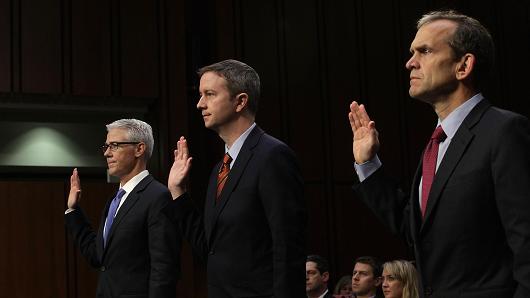
Getty Images
(L-R) Vice President and General Counsel for Facebook Colin Stretch, General Counsel for Twitter Sean Edgett, and Senior Vice President and General Counsel for Google Kent Walker are sworn in during a hearing before the Senate (Select) Intelligence Committee November 1, 2017 on Capitol Hill in Washington, DC.
Members of Congress blasted representatives from Facebook, Twitter and Google on Wednesday for their inadequate response to Russian mischief made on their platforms during the 2016 presidential election.
“I don’t think you get it,” Sen. Diane Feinstein, (D-Calif.) told the general counsels from the three companies during a hearing of the Senate Intelligence Committee. “What we’re talking about is a cataclysmic change. What we’re talking about is the beginning of cyber warfare.”
Facebook’s Colin Stretch, Twitter’s Sean Edgett and Google’s Kent Walker revealed little new information about the extent of foreign influence on their platforms.
The companies came noticeably under-prepared to provide the type of information senators were seeking. Stretch, Edgett and Walker produced statistics of Russia-linked advertisements and accounts, but questions of more general Russia propaganda on the platforms and socially divisive content drew only silences and promises to provide the information at a later date.
Facebook said this week Russian-backed election content on the platform reached 126 million Americans; Twitter found 36,000 Russian accounts were active during the election; and Google said pro-Russian groups purchased $4,700 worth of ads on its platforms.
Senators repeatedly interrupted the general counsels’ answers and moved on before allowing them to finish, clearly exasperated by the counsels’ tendency to provide long-winded answers — and often by the answers themselves.
“It’s not clear that you or the public understand the degree of this,” Sen. Ron Wyden (D-Oregon) said. “You need to stop paying lip service.”
Wyden asked the general counsels whether they were satisfied with their respective platform’s monitoring of foreign influence during the 2016 presidential election — all three said no.
“This is not a Democrat or Republic issue. This is an American issue”, Sen. Joe Manchin (D-WV) said. “You cannot allow what’s going on against the United States of America. You’re on the front lines with us.”
Manchin said the companies’ inaction threatened the security, safety and “sovereignty of our nation.”
The week’s hearings could mark a turning point for the internet giants as discussions of regulation come to fore. Twitter and Facebook have each moved to increase transparency around advertising, after public comments by CEOs Jack Dorsey and Mark Zuckerberg.
Several senators indicated during the Wednesday hearing that legislation could be on the horizon for the tech companies, though they varied on the extent.
Manchin asked for the companies’ reactions to the proposed Honest Ads Act that would require greater information around political content (only Twitter provided an answer, and it was mostly positive). Sen. James Lankford said any legislation could be only the “lightest touch.”
 EU News Digest Latest News & Updates
EU News Digest Latest News & Updates



